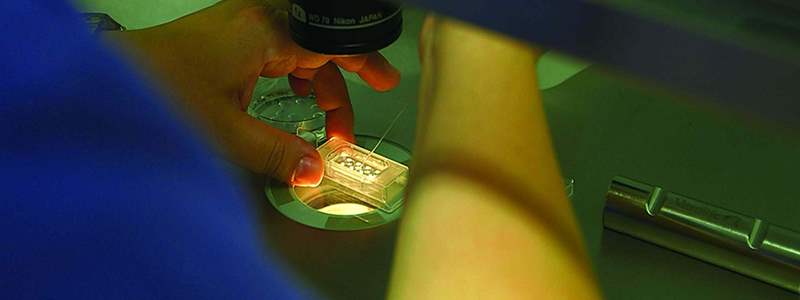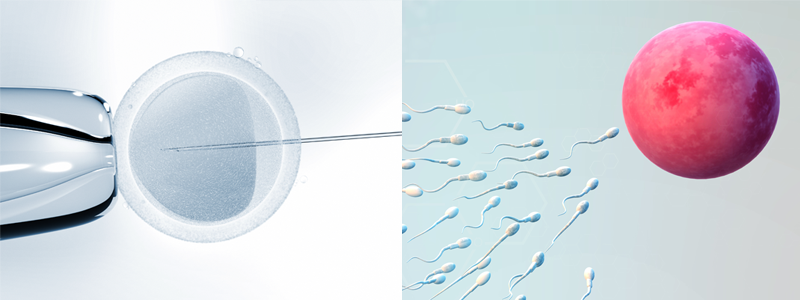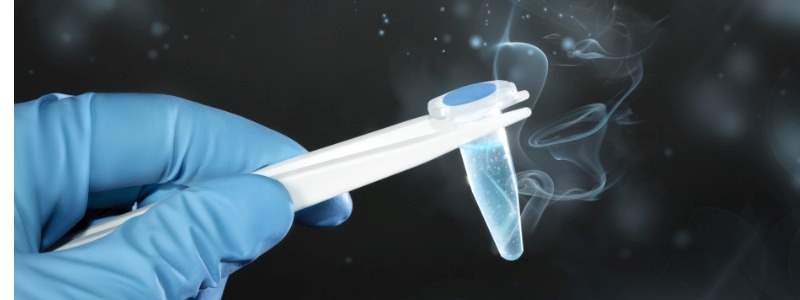PGD stands for pre-implantation genetic diagnosis. It refers to the genetic screening of embryos prior to implantation. Embryos are created in IVF after eggs are collected from a woman and fertilised with sperm. Usually, these embryos are left to mature in the lab before the healthiest-looking are implanted into the womb. With PGD however, a more extensive examination of the embryos is performed, as one of the cells is removed and genetically profiled. This genetic profiling can be used to look for the presence of known genetic disease, the sex of the embryo and the tissue type of the embryo.
The history of PGD
Scientists began looking at embryo cells back in the 1960s and were able to identify the sex of early stage rabbit embryos in 1967. In the 80s IVF was developed, and in the same decade the polymerase chain reaction (PCR) was discovered, which enabled scientists to multiply small sections of DNA in order to look at them more closely. These two advancements combined allowed researchers to begin to look at human embryos, and by 1989 PGD was used successfully for the first time, with the first babies born from this method in 1990.
The uses of PGD
PGD is used for a variety of reasons, although its use in this country is limited to exceptional circumstances.
Screening for disease: This is the primary use for PGD. Screening is used to check for disease carried on a single gene, which is often already known to be carried in the family. In this way, the risk of the child inheriting the disease can be minimised. Examples of genetic disease which are commonly screened for are Huntingdon’s disease, sickle cell disease and cystic fibrosis.
Saviour siblings (pre-implantation tissue typing): There are some cases in which an embryo is selected to be a tissue match for an existing sibling. Although this is rare, there are occasionally cases where a child needs some kind of tissue transplant and a live donor cannot be found. In these situations, parents sometimes turn to IVF. By creating a number of embryos and screening for tissue types, an embryo can be selected which has the same tissue type as the affected sibling.
Improving the chances of pregnancy: One type of genetic analysis is pre-implantation screening (PGS), where the embryo is screened for genetic abnormality so that the highest quality embryo can be placed back in the womb.
Sex selection: Although PGD can be used in detect the sex of the embryo, it is illegal in the UK. CREATE Fertility does not support the use of sex selection.
Controversy surrounding PGD
Controversy around PGD tends to focus on the ethical issues raised by the technique. When used for what it was designed for, it is a useful technique which saves many from the pain and heartbreak of having a child with a genetic disease. However, some argue that selecting a future child on the basis of their genetics is tantamount to eugenics. The practice of sex selection in particular is viewed by some as a slippery slope towards ‘designer babies’ and it has the potential to skew gender ratios if one gender is preferred. It is worth noting that the use of PGD is highly regulated in the UK and sex selection is illegal.
Another criticism of genetic screening that it doesn’t necessarily improve the chances of success in every case, because one of the cells is removed which may destabilise the embryo and reduce the chance of it implanting. There is also a risk that the cell that is removed is not representative of the whole embryo. However, these risks are small and your Consultant will be able to tell you whether PGD is appropriate for you.
Is PGD worthwhile?
PGD is a ground-breaking technology which enables parents where there is a suspected to genetic problem to have children when otherwise it may not be possible. It is a valuable technology which we fully support here at CREATE Fertility.
If you would like to consider PGD for yourself, just contact the clinic to arrange a consultation with one of our doctors.






